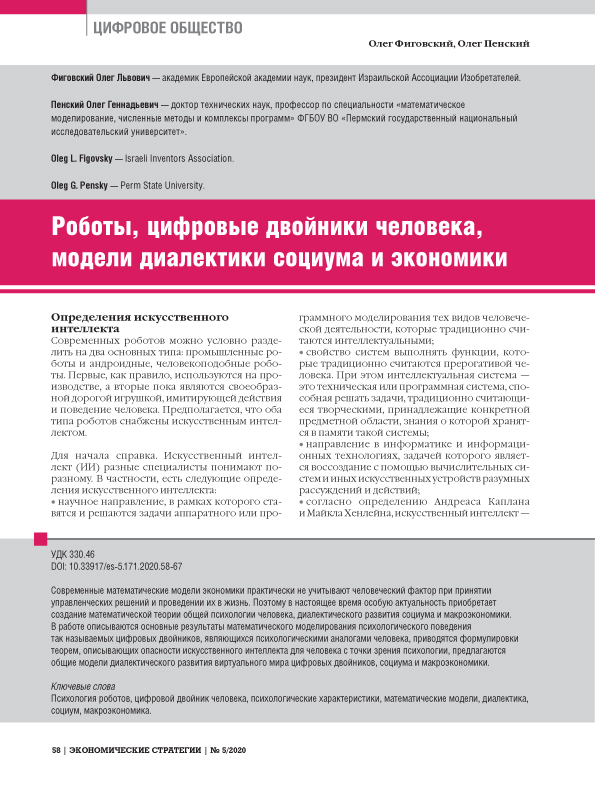Robots, Digital Twins of People, Dialectical Models of Society and Economics
DOI: 10.33917/es-5.171.2020.58-67
Demographic crisis remains one of the main challenges to socio-economic development of Russia. The COVID–19 pandemic
has aggravated preconditions for a possible recovery from depopulation. The present article substantiates the need to develop and approve the RF social doctrine upon completion of national projects in 2018–2024. The authors suggest their own approach to overcoming the socio-demographic crisis with regard to the long-term demographic dynamics in Russia. Various scenarios of the “post-coronavirus” future of both specific countries and the world as a whole are proposed
References:
1. Sharapov Yu.A. Matematicheskie modeli emotsional’nykh robotov, sposobnykh zabyvat’ informatsiyu [Mathematical Models of Emotional Robots Capable to Forget Information]. Dis. … kand. fiz.-mat. nauk. Ekaterinburg, UrFU, 2019, 168 p.
2. Baxter P., Browne W. Memory as the substrate of cognition: A developmental cognitive robotics perspective. In: Johansson, B., Sahin, E., Balkenius, C. (eds.). Proceedings of the International Conference on Epigenetic Robotics (EpiRob), 2010, pp. 19–26.
3. Correia L., Abreu A. Forgetting and Fatigue in Mobile Robot Navigation. Advances in Artificial Intelligence — SBIA 2004 Lecture Notes in Computer Science.2004. P. 434–443.
4. Kira Z., Arkin R. Forgetting bad behavior: memory for case-based navigation. 2004 IEEE/RSJ International Conference on Intelligent Robots and Systems (IROS) (IEEE Cat. No.04CH37566).
5. Freedman S.T., Adams J.A. Filtering Data Based on Human-Inspired Forgetting. IEEE Transactions on Systems, Man, and Cybernetics, Part B (Cybernetics), 2011, no 6 (41), pp. 1544–1555.
6. Anderson J.R., Lebiere C. The atomic components of thought. Psychology Press, Taylor et Francis Group, 2012.
7. Brown G.D.A., Chater N., Neath I. A temporal ratio model of memory. Psychol. Rev., 2007, July, vol. 114, no 3, pp. 539–576.
8. Alnajjar F., Zin I.B.M., Murase K.A Hierarchical Autonomous Robot Controller for Learning and Memory: Adaptation in a Dynamic Environment. Adaptive Behavior, 2009, no 3, pp. 179–196.
9. Freitas A.A., De Carvalho A.A. Tutorial on Hierarchical Classification with Applications in Bioinformatics. In: D. Taniar (Ed.) Research and Trends in Data Mining Technologies and Applications, 2007, pp. 175–208.
10. Ho W.C., Lim M., Vargas P.A., et al. An Initial Memory Model for Virtual and Robot Companions Supporting Migration and Long-term Interaction. ROMAN, 2009.
11. Lim M., Ho W.C., Vargas P.A., et al A Socially-Aware Memory for Companion Agents. Materials of 9th International Conference on Intelligent Virtual Agents, Amsterdam, 2009.
12. Vargas P.A., Freitas A.A., Lim M., et al. Forgetting and Generalisation in Memory Modelling for Robot Companions: a Data Mining Approach. Materials of Human Memory for Artificial Agents Symposium at the AISB 2010 convention. De Montfort University, Leicester, UK, 2010.
13. Vargas P.A., Ho W., Lim M., et al. To forget or not to forget: towards a roboethical memory control. Google Scholar, 2009.
14. Dorner D., Hille K. Artificial souls: motivated emotional robots. 1995 IEEE International Conference on Systems, Man and Cybernetics. Intelligent Systems for the 21st Century, 1995, pp. 3828–3832.
15. Lim M.Y. Emotions, Behaviour and Belief Regulation in An Intelligent Guide with Attitude. Ph.D. thesis, School of Mathematical and Computer Sciences, Heriot-Watt University. Edinburg, 2007.
16. Figovskii O.L., Gumarov V.A. Innovatsionnye sistemy: dostizheniya i problem [Innovative Systems: Achievements and Challenges]. Germany, Lambert AP, 2018.
17. Figovskii O.L., Gumarov V.A. Innovatsionnye sistemy: perspektivy i prognozy [Innovative Systems: Prospects and Forecasts]. Germany, Lambert AP, 2019.
18. Penskii O.G., Chernikov K.V. Osnovy matematicheskoi teorii emotsional’nykh robotov [Fundamentals of the Mathematical Theory of Emotional Robots]. Perm’, Permskii gos. un-t, 2010, 256 p.
19. Penskii O.G., Sharapov Yu.A., Oshchepkova N.V. Matematicheskie modeli robotov s neabsolyutnoi pamyat’yu i prilozheniya modelei [Mathematical Models of Non-Absolute Memory Robots and Models Applications]. Perm’, Izd-vo PermGU, 2018, 310 p.
20. Penskii O.G. Matematicheskie modeli tsifrovykh dvoinikov [Mathematical Models of Digital Doubles]. Perm’, Izd-vo PermGU, 2019, 156 p.
21. Sharapov Yu.A. Programma opredeleniya koeffitsientov kratkovremennoi pamyati cheloveka “CMemory” [“CMemory” Program for Determining Coefficients of Short-Term Human Memory]. Svidetel’stvo o gosudarstvennoi registratsii programmy dlya EVM no 2012616009, data vydachi: 29.06.2012.
22. Chernikov K.V. Matematicheskie modeli robotov s neabsolyutnoi pamyat’yu [Mathematical Models of Robots with Non-Absolute Memory]. Dis. … kand. fiz.-mat. nauk. Perm’, PNIPU, 2013, 139 p.
23. Mikhailov V.O., Penskii O.G. Sposob vychisleniya temperamenta cheloveka i robota [Method for Calculating the Temperament of a Person and Robot]. Vestnik Permskogo universiteta, Seriya: Matematika. Mekhanika. Informatika, 2016, no 1, pp. 27–32.
24. Biometricheskie sistemy [Biometric Systems]. Psymaker, available at: http://www.psymaker.com/ru/shop/legkie-versii/
25. Penskii O.G. Raschet planirovaniya vypuska mediaproektov v efir [Calculation of Planning the Release of Media Projects on the Air]. Svidetel’stvo o gosudarstvennoi registratsii programmy dlya EVM no 2016660145, data vydachi: 07.09.2016.
26. Penskii O.G. Matematicheskie modeli dialektiki virtual’nogo mira [Mathematical Models of the Virtual World Dialectics]. Vestnik Permskogo universiteta, Seriya: Matematika. Mekhanika. Informatika, 2019, no 2, pp. 57–65.
27. Penskii O.G. Vychislenie vremeni perekhoda sistemy v novoe kachestvo [Calculating the Time of a System Transition to the New Quality]. Svidetel’stvo o gosudarstvennoi registratsii programmy dlya EVM no 2020610759, data vydachi: 20.01.2020.
28. Figovskii O.L. Chto meshaet Rossii stat’ khai-tek-derzhavoi? Interv’yu programme E.Ya. Satanovskogo “Ot trekh do pyati” [What Prevents Russia from Becoming a High-Tech Power? Interview to the Program “From Three to Five” of E.Y. Satanovsky]. Vesti FM, 2020, January, 13, available at: https://radiovesti.ru/person/253875/



